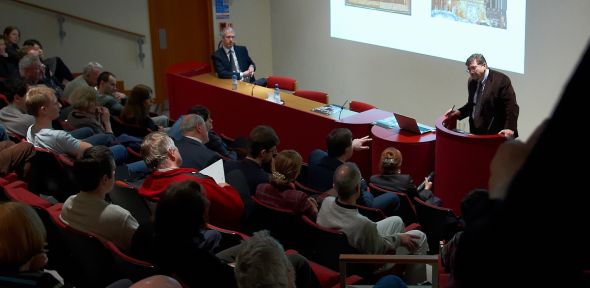
A leading expert in Eastern European history will examine whether the seeds of the liquidation of the Ukrainian Greek Catholic Church were sown at the 1945 Yalta conference in a free, public lecture this week.
The talk, entitled 'The Ghosts of Yalta: Ukraine and the Religious Division of Europe', will be delivered by Serhii Plokhii, Mykhailo Hrushevsky Professor of History at Harvard University and author of the book Yalta: The Price of Peace (2010). It will take place on Friday, 25 February at 5pm in the Umney Theatre at Robinson College, Cambridge.
The lecture, which is the ninth in the annual Stasiuk series in contemporary Ukrainian Studies, explores the implications of the famous Yalta conference, which brought Winston Churchill, Franklin D Roosevelt, and Joseph Stalin together for eight days in February 1945 to discuss the organisation of post-World War II Europe.
“The Stasiuk Lecture has become a landmark event in the Ukrainian Studies calendar in western Europe"
Dr Rory Finnin
At the end of the Yalta Conference, a special envoy of Franklin Delano Roosevelt and Edward J. Flynn, an American diplomat, travelled to Moscow to meet with Joseph Stalin, Vyacheslav Molotov and the newly elected patriarch of the Russian Orthodox Church to discuss the treatment of religion by Soviet authorities. Less than a month after Flynn concluded his talks in Moscow and went to Rome to see the Pope, the Soviet authorities arrested the entire hierarchy of the Ukrainian Greek Catholic Church in the newly-acquired western provinces of the Soviet Union. Over the course of the following year, the five-million-strong church, which had been under the jurisdiction of Rome, was liquidated, and its faithful persecuted and forced underground.
Professor Plokhii’s talk will question whether these acts of violence had anything to do with the decisions made at Yalta and Flynn's trip to Moscow. The talk engages this and other related questions, elucidating previously unknown aspects of the division of Europe into spheres of influence.
Initiated in 2003 with the support of the Stasiuk Programme at the University of Alberta, the annual Stasiuk Lecture in Contemporary Ukrainian Studies explores the internal dynamics and international implications of events in today's Ukraine and features the foremost experts in the fields of Ukrainian politics, history, and society.
“The Stasiuk Lecture has become a landmark event in the Ukrainian Studies calendar in western Europe," said Dr Rory Finnin, University Lecturer in Ukrainian Studies and Director of the Cambridge Ukrainian Studies programme. “As the lecture series enters its second decade, we are very honoured to have the versatile and accomplished historian Serhii Plokhii share his groundbreaking research into the ways in which the Yalta Conference helped shape the destiny of contemporary Ukraine, and of Europe itself.”
Serhii Plokhii is Mykhailo Hrushevsky Professor of Ukrainian History at Harvard University. His research interests include the intellectual, cultural, and international history of Eastern Europe, with an emphasis on Ukraine. He is the author of Ukraine and Russia: Representations of the Past (2008) and The Origins of the Slavic Nations: Premodern Identities in Russia, Ukraine and Belarus (2006), among other works.




